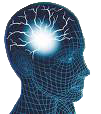Sugar and the brain.
Although I have discussed the relationship of blood sugar levels and headpain before, with all the recent news coverage of the ‘evils’ of sugar, I thought perhaps it was time to revisit this important issue from the perspective of the brain.
Since the brain needs glucose from the blood to work properly (indeed the brain is second only to exercising muscles when it comes to glucose requirements), it is not surprising that unstable blood sugar levels leads to sub-optimal brain function.
Basically, sugar, a simple carbohydrate, is obtained from various foods/drinks in the diet and transported as glucose in the blood and delivered to all the bodies’ cells to provide energy. Of all the organs and tissues in the body, the brain is the most dependent on a stable minute-by-minute supply of glucose from the blood to function normally.When blood glucose levels drop, the brain immediately suffers, resulting in a number of symptoms, including fatigue, mood changes (irritability, anxiety, depression, etc), headaches/migraines, dizziness/faintness, cognitive problems (forgetfulness, confusion, poor concentration etc.), fainting and even coma if levels drop too far, for too long.
Now you may be wondering why I’m talking about low blood sugar levels when all the media fuss is about diets that are too high in sugar.
Needless to say the biochemical explanation is rather complicated, but basically following a meal high in sugars/simple carbohydrates (more of this later) the digestive processes are able to quickly convert them into glucose that then rapidly enters the bloodstream. This sudden increase in blood glucose is quickly
detected, resulting in an automatic release of higher than usual quantities of insulin (a hormone produced by the pancreas) that basically causes glucose to be removed from the blood and enter the ‘storage’ cells in the liver. This will cause a relatively rapid decrease in blood glucose levels, often leading to lower than optimal levels
( hypoglycaemia ) which results in lowered glucose supply to the brain and the inevitable signs of brain dysfunction mentioned above.
Further confusion arises when it comes to considering foods that cause rapid increases in blood glucose. Most people naturally assume it would be table sugar, sweets, chocolate, cakes, fizzy drinks etc. If only it was this simple. Unfortunately there are many other foods/drinks common in our diets that also cause unnaturally rapid increases in blood glucose, such as white rice, white pasta, white bread, bananas, fruit juices, all alcoholic beverages, and many others.
Then there is the disturbing fact that virtually all processed foods have some form of sugar added; check the label and you will be astonished at the number of products that have a high sugar content, even in foods you would never suspect such as cereals, processed meats, soups, even so-called ‘healthy’ muesli bars, the list goes on and on.
Therefore if you are someone prone to headaches or migraines, it is one more reason to try to limit/reduce the amount of sugar, or sugar ‘equivalents’ that you consume.The relative ‘sugariness’ of many foods and drinks is called the Glycocemic index( the higher the number/index, the more it results in the rapid rise in blood glucose which you are trying to avoid). It is possible to check this either by going online or there are several books on low Glycocemic diets. And needless to say, start checking the labels of foods that you regularly consume for added sugar and be ready for some surprises!

